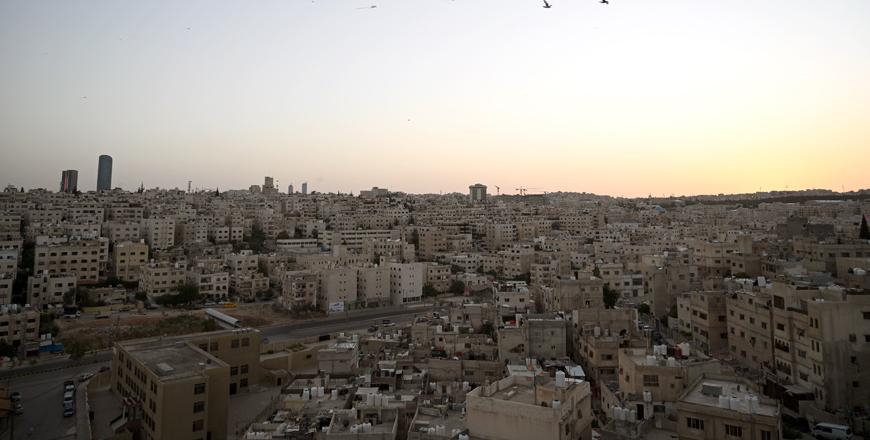You are here
Jordan drops one place in World Competitiveness Ranking — report
By Bahaa Al Deen Al Nawas - Jun 16,2020 - Last updated at Jun 16,2020

Among the challenges facing Jordan in 2020 are high unemployment especially among women and youth and maintaining macroeconomic and fiscal stability, according to the annual IMD World Competitiveness Ranking (Photo by Amjad Ghsoun)
AMMAN — Jordan dropped one place — from the 57th rank in 2019 to the 58th in 2020 — in the annual IMD World Competitiveness Ranking comprising 63 countries.
The report, published by the Swiss-based institute IMD every year, provides detailed information on countries’ performance in regards to the efficiency of their economies, governments, businesses and infrastructure, covering a wide array of categories.
The challenges facing Jordan in 2020 include: High unemployment especially among women and youth and maintaining macroeconomic and fiscal stability, as well as regional instability and continuing to host a large refugee population, according to the report.
Challenges also include the repercussions of the coronavirus crisis on the economy and "weak economic growth", in addition to the high cost of electricity, which affects the competitiveness of business and economic sectors, the report said.
In the competitiveness evolution section, the report mentioned "the 15 biggest improvements and the 15 biggest declines in the overall performance of the economy".
In the Kingdom, the 15 improvements were in consumer price inflation, exchange rate stability, real GDP growth per capita, current account balance, number of patents in force, country credit rating, adaptability of government policy, transparency, exports of commercial services and gasoline prices.
They also included renewable energies, justice, pupil-teacher ratio (secondary education), government subsidies and bureaucracy.
Among the 15 declines were labour force long-term growth, compensation levels, patent application per capita, government budget surplus/deficit, population growth, employment long term growth, brain drain and tax evasion.
They also include parallel economy, pupil-teacher ratio (primary education), new business density, stock market capitalisation, use of digital tools and technologies, shareholders' rights and environmental growth.
"From a list of 15 indicators, respondents of the Executive Opinion Survey were asked to select five that they perceived as the key attractiveness factors of their economy," the report said.
The indicators and percentages are: Skilled workforce (56.3 per cent), high educational level (48.8 per cent), policy stability and predictability (47.5 per cent), access to financing (46.3 per cent), business-friendly environment (32.5 per cent), open and positive attitudes (32.5 per cent), reliable infrastructure (31.3 per cent) and strong R&D culture (27.5 per cent).
The indicators also include effective legal environment (27.5 per cent), dynamism of the economy (26.3 per cent), effective labour relations (23.8 per cent), cost competitiveness (22.5 per cent), competency of government (22.5 per cent), quality of corporate governance (21.3 per cent) and competitive tax regimes (16.3 per cent).
In the economic performance ranking, Jordan stayed in the 62nd rank in 2019 and 2020. However, the Kingdom fell from the 35th to the 46th rank in the business efficiency ranking for the same period.
In the government efficiency ranking, Jordan dropped from the 43rd to the 45th place in the same comparison period as well, while infrastructure remained in the 58th rank.
The IMD also launched a press release titled "Small Economies Sweep the Board in 2020 Competitiveness Rankings" on the World Competitiveness Ranking 2020.
It revealed that Singapore has retained the first place in both 2019 and 2020, in “the Institute for Management Development’s analysis of global economies and their ability to generate prosperity".
"Coming in behind Singapore and making up the Top 5 were, in order: Denmark, Switzerland, the Netherlands and Hong Kong SAR," the statement said.
Arturo Bris, director of the IMD World Competitiveness Centre and professor of finance, said in the statement: “The benefit of small economies in the current crisis comes from their ability to fight a pandemic and from their economic competitiveness. In part, these may be fed by the fact it is easy to find social consensus.”
However, the ranking results are the combined fruit of responses in Q1 2020 from business executives on questions about how they perceive their country’s economy and hard data from 2019, according to the statement.
On a regional level, the statement said: "The Middle East struggled, reflecting the oil crisis, with the UAE leading the region of Western Asia and Africa in ninth, although it was fifth in 2019. Whilst Qatar [14th] and Jordan [58th] dropped marginally, Saudi Arabia proved the exception climbing up two spots to 24th."
Related Articles
AMMAN—Jordan ranked 53rd among 61 countries in the 2016 IMD World Competitiveness rankings, in which economies are ranked from the most to t
AMMAN — Jordan ranks 141st globally, and 13th in the Arab world, for women’s representation in Parliament, the Sisterhood Is Global Institut
AMMAN — Jordan has achieved a high ranking in various sub-indicators despite dropping five places overall from 2018 in a digital compe

















